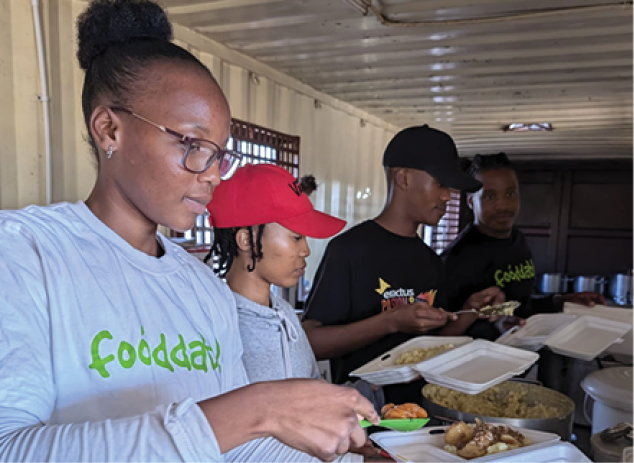In a powerful fusion of compassion, technology and entrepreneurship, Tumisho Thobejane, a postgraduate student at the Vaal University of Technology (VUT), is changing the way food waste and hunger are addressed in South Africa.  Thobejane is the founder of Fooddable, a pioneering initiative that partners with fast-food outlets to transform surplus food into nutritious meals for those in need. Her work recently earned her a top-five spot at the Global Student Entrepreneur Awards (GSEA) in Pakistan in February 2025 — a major global stage for student-led ventures. “I’m deeply grateful for the incredible support I received from VUT,” said Thobejane. “The contributions from the Deputy Vice-Chancellor, the Activation Office, the Technology Transfer Office, and the International Office made it possible for me to compete internationally and showcase what young South Africans are capable of.” Originally from Katlehong in Gauteng, Thobejane is about to complete her Postgraduate Diploma in Biomedical Technology at VUT.
Thobejane is the founder of Fooddable, a pioneering initiative that partners with fast-food outlets to transform surplus food into nutritious meals for those in need. Her work recently earned her a top-five spot at the Global Student Entrepreneur Awards (GSEA) in Pakistan in February 2025 — a major global stage for student-led ventures. “I’m deeply grateful for the incredible support I received from VUT,” said Thobejane. “The contributions from the Deputy Vice-Chancellor, the Activation Office, the Technology Transfer Office, and the International Office made it possible for me to compete internationally and showcase what young South Africans are capable of.” Originally from Katlehong in Gauteng, Thobejane is about to complete her Postgraduate Diploma in Biomedical Technology at VUT.
It was through a student innovation programme called Elapses in 2023 that Fooddable was born. “The programme focused on the Sustainable Development Goals, and as a team, we decided to focus on Goal 12 — responsible consumption and production. We researched food waste and insecurity, especially within retail and fast-food supply chains.” When larger retailers were unresponsive, the team pivoted to fast-food restaurants. “We confirmed that there was food waste, but restaurants were hesitant to give away free meals. So, we created a system where donors purchase tokens, and people in need redeem those tokens for meals at participating outlets,” Thobejane said.
At the heart of Fooddable is an innovative cashless system using 3D-printed tokens, each embedded with a QR code. These tokens are exchanged for meals made from surplus ingredients. “Before VUT gave us access to 3D printing, we were using paper and cardboard. But they got damaged easily. Now, thanks to VUT’s support and training in computer design, we are able to produce durable tokens — a real blessing.” Although major fast-food chains initially declined to participate, local restaurants embraced the pilot. “We got quite a negative response from franchises because we were testing a prototype. But local restaurants welcomed us warmly. We’ve worked with some of them since 2024, and the relationships are still strong.”
Fooddable also made waves at the EDHE Intervarsity competition, supported by the South African Breweries Foundation, where it took first place in the Social Impact category. The programme provides mentorship and funding to studentpreneurs. “We are still in a developmental phase, with plenty of ups and downs. But we’re determined to gather enough data to expand and improve. The end goal is simple: to reduce food waste, feed people in need, and support local businesses,” Thobejane concluded.
📩 For more information about Fooddable, email info@fooddable.co.za or visit their Facebook page: Fooddable



 Facebook
Facebook Twitter
Twitter WhatsApp
WhatsApp